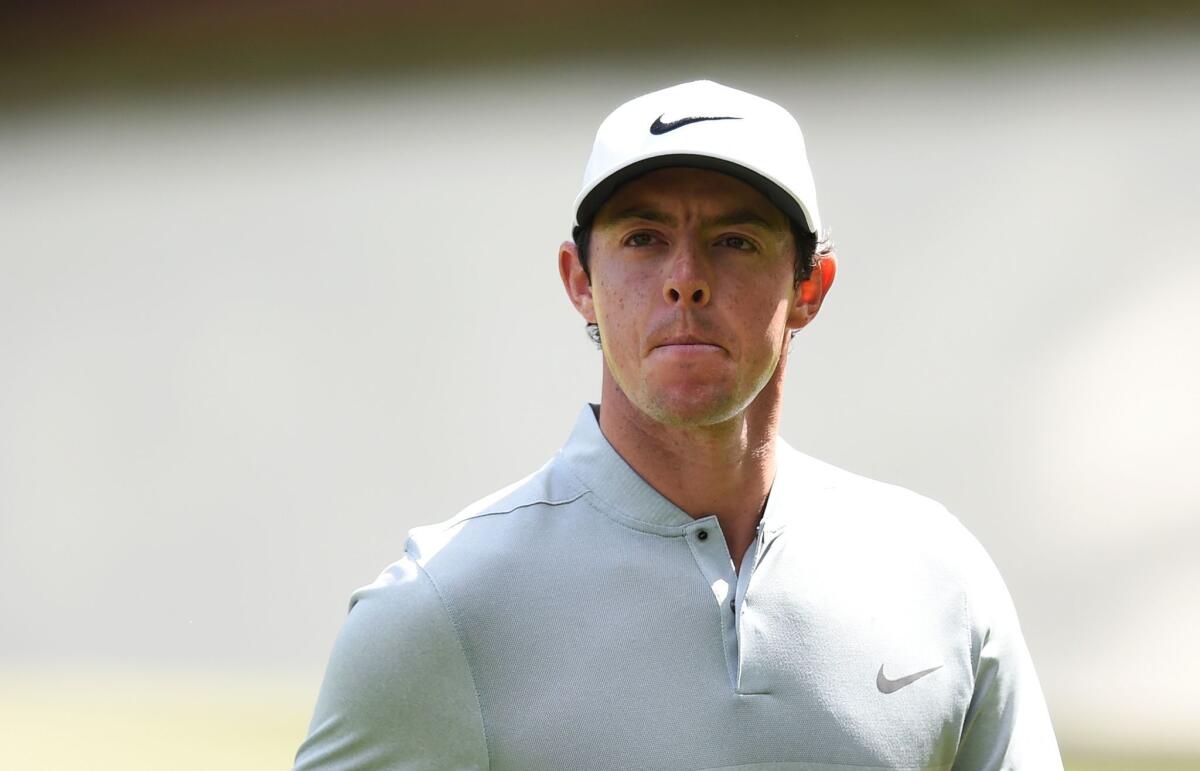Commentary: Rory McIlroy says golfers are not really Olympic athletes

- Share via
In a moment when his mouth moved before his brain had a chance to do some editing, Rory McIlroy eloquently laid out the crisis of conscience for pro golfers in the Olympics.
Speaking to David Feherty on the Golf Channel a couple of weeks ago, shortly after he’d won the Irish Open and still was expressing enthusiasm about going for the gold in Brazil, McIlroy said what others must be feeling.
“To call yourself an Olympian, I feel somewhat …” he said before a contemplative pause. “It does an injustice to the people who have trained for four years for this event. Golfers are going to go down there for a week, pitch up and enjoy the whole thing.
“People have had to sell their cars and sell their homes just to afford to train to compete at the Olympics. I think sometimes we take that for granted.”
Feherty’s show first aired June 20. Two days later, McIlroy announced that he would not be going to the Olympics — not to uphold some Olympic ideal, but because of concerns over the Zika virus.
At No. 4 in the world, McIlroy was the highest-ranked player to pull out before No. 1 Jason Day did so on Tuesday, joined by No. 25 Shane Lowry, the Irishman who contended late into the fourth round of the recent U.S. Open.
Keeping track of the withdrawals has become a chore. In fact, the International Golf Federation addressed the first handful with separate statements, but it’s stopped that now, because how many ways can you say, “We’re disappointed, but it’s going to be a great tournament anyway.”
Ten eligible male players have withdrawn from the games, which will feature fields of 60 men and 60 women competing over 72 holes. Six of those have cited Zika as their reason for leaving.
As more of the top players pull out, there is a growing suspicion that this is as much about choosing convenience over hassle, saving energy for where the real money lies in the PGA Tour’s FedEx Cup playoffs, and the recognition that an Olympic medal won’t gild a golf career the way a major championship does.
To McIlroy’s original point, there are kayakers, archers, equestrians and cyclists who will spend just as much time exposed to mosquitoes as golfers in Rio, but they’re not running for the exits because this is their life’s goal, their shot at glory. They’re not going to pass up a chance for fame and glory with odds that some health organizations have put at 500,000-1 for catching the virus.
It seems like a reasonable risk to call yourself an Olympian, but that always was the problem with the concept of pro golfers playing in the Summer Games: It never was going to mean more than the four majors each year, or the Players Championship or the Ryder Cup.
Tellingly, only one woman – South Africa’s Lee-Anne Pace, who withdrew on Wednesday, citing Zika -- has pulled out of the Olympics. The perception might be that for women, a medal would surpass most achievements and satisfaction they might get on their tour.
In 2009, when golf was accepted into the Olympics after an extensive campaign by the sport’s most powerful governing bodies, the game looked too good to pass up for the International Olympic Committee, which saw huge dollar signs. Tiger Woods seemed in his prime, and NBC/Golf Channel were happy to pay for the high-profile programming.
Those of us in the media who scoffed at pro golfers in the Olympics were admonished by IGF officials for not seeing the big picture: primarily, that golf’s stature and resources in developing countries would increase dramatically when attached to the Olympics.
Tennis is cited. It is said there were 23 countries represented at Wimbledon in 1988, the year tennis was reintroduced to the Olympics. This year, there are more than 80 countries involved.
That kind of growth isn’t to be taken lightly, but Olympic golf could be just as appealing with amateurs who have fresh stories to tell and a fire in their gut for gold.
You have to run your finger far down the list of current Olympic qualifiers for nuggets, but there are a few: 5-foot-5 Siddikur Rahman is the “Tiger Woods of Bangladesh”; India’s Shiv Chawrasia is a 38-year-old greens-keeper’s son with the nickname of “Chip-putt-sia” for his renowned short game; and Rodolfo Cazaubon was born in Mexico, schooled at the University of North Texas and plays on the Latinoamerica Tour.
There is virtually no chance that any of them will make the medal stand, but we can dream the Olympic dream. Or at least the way we once did.
Rio Olympics live updates blog »
Leonard writes for the San Diego Union-Tribune.
More to Read
Go beyond the scoreboard
Get the latest on L.A.'s teams in the daily Sports Report newsletter.
You may occasionally receive promotional content from the Los Angeles Times.










